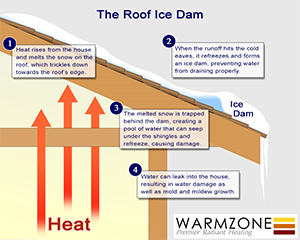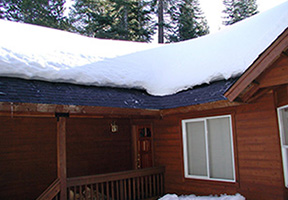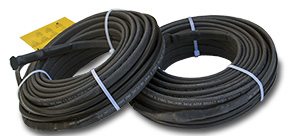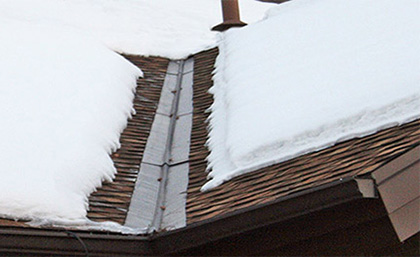Minneapolis and St. Paul Roof and Gutter De-icing Solutions
Preventing Ice Dams and other Potential Winter Roof Damage
 Minneapolis / St. Paul residents are encouraged to inspect their roofs twice a year in order
to catch any potential problems and avoid costly water damage that can result from ice dams
and other instances of roof damage. Oftentimes, tiny amounts of water can seep into the home
over long periods of time without being detected, only to result in costly water and even mold
damage before being discovered.
Minneapolis / St. Paul residents are encouraged to inspect their roofs twice a year in order
to catch any potential problems and avoid costly water damage that can result from ice dams
and other instances of roof damage. Oftentimes, tiny amounts of water can seep into the home
over long periods of time without being detected, only to result in costly water and even mold
damage before being discovered.
While most roofs are constructed to easily handle the winter weather and snow load demands that are typical of Minnesota winters, ice dams still present problems for too many homeowners. But ice dams and subsequent water damage can be prevented with an effective roof heating system. Warmzone carries a variety of roof de-icing solutions that can be installed along the roof eaves to prevent ice dams from forming. Heat trace cable can also be installed to heat gutters and downspouts, providing a clear channel for runoff.
How Ice Dams Form
Due to reoccurring thawing and freezing of snow and ice during the winter months in Minnesota, ice dams can be a common problem for homeowners in the Twin Cities. Warm air rises from the home into the attic where it warms the roof, causing the base layer of snow on the roof to melt. The water runs down the roof but because the eaves are not warmed by the attic, the water refreezes at the colder eaves, forming a ridge of ice. Over time more water runs down and refreezes to eventually create an ice dam. When enough ice is present the water running down the roof pools up behind the ice. This is where costly problems can originate.
Water can seep into tiny cracks within the shingles or under the shingles. When that water refreezes at night, the expanding ice can enlarge the cracks, and over time the integrity of the roof can be jeopardized.
Low-voltage RoofHeat STEP
The ideal way to prevent ice dams from forming is to install a roof de-icing system at the roof’s edge. Warmzone’s low-voltage RoofHeat STEP is one of the leading roof de-icing systems available. Thin, flexible polymer panels are installed directly under the shingles. A transformer is used with the system to step down high voltage to low voltage (60V or less) and monitor the output of the heating element to ensure safe, efficient performance. This system is a favorite among roofing professionals and can also be safely used to heat metal roofs.
Heat Trace Cable
 Another popular and affordable roof de-icing option is self-regulating heat trace cable. The cable
can be zigzagged along the roof’s edge to break up ice dams and create channels for the runoff to reach
the gutter. Additional heat cable is routed inside the roof gutters and downspouts to further facilitate
runoff. The heat trace cable provides an effective and very affordable roof de-icing solution. Constant
wattage cable is also available from Warmzone for small problem areas.
Another popular and affordable roof de-icing option is self-regulating heat trace cable. The cable
can be zigzagged along the roof’s edge to break up ice dams and create channels for the runoff to reach
the gutter. Additional heat cable is routed inside the roof gutters and downspouts to further facilitate
runoff. The heat trace cable provides an effective and very affordable roof de-icing solution. Constant
wattage cable is also available from Warmzone for small problem areas.
 Warmzone roof heating solutions have proven to be among the best in the industry. Contact a
roof heating expert today to learn more about the options available, and never have to worry about
ice dams and ice-damaged gutters again (888.488.9276).
Warmzone roof heating solutions have proven to be among the best in the industry. Contact a
roof heating expert today to learn more about the options available, and never have to worry about
ice dams and ice-damaged gutters again (888.488.9276).
Warmzone Roof De-icing Systems and Services
Warmzone radiant heat experts have been around a long time, and we understand all aspects of designing and installing an effective roof heating system. Several roof heating options are available and each option can be easily customized to remove snow and ice melting from just about any type of roof. We’ll work with you to evaluate your project and recommend the best solution for your budget and roof de-icing needs.
Call a radiant heating expert today at 888.488.9276 to learn more about your options. We’re happy to answer any questions you may have – without any pushy sales pressure.
